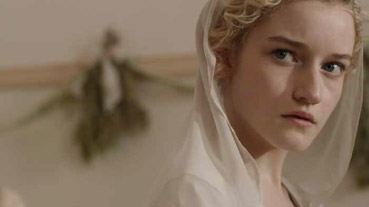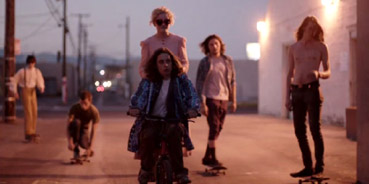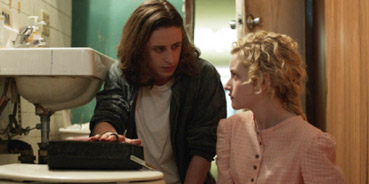|
Rebecca Thomas draws on her own experiences of being raised in a Mormon community for her memorably atmospheric directorial debut, a clear-eyed look at the price of faith and freedom.
Forced to fly the coop, a wayward brother and sister from dust bowl Utah head for the bright lights of Las Vegas, abandoning the community they were born into and make a new one out on the road.
The latest contribution to US indie film's on-trend depictions of commune life, Electrick Children takes a far less disturbing tact than Higher Ground, The Sound of My Voice and Martha Marcy May Marlene, which notably featured lead actress Julie Garner in a supporting part as one of Martha's inductees.
Far from a damming indictment of the Mormon culture to which she no longer belongs, Thomas puts the family in fundamentalism, affirming a cloistered yet caring, mostly harmonious portrait of self-sustaining American isolationism. The model may not be socially recognised, but Thomas is keen to point out that it clearly works, and six million believers in the US and Canada are proof of that.

The atmosphere of this dusty Utah commune makes one think of frontier settlers rather than brainwashed cult worshippers, though the casting of affable and frightening Billy Zane as the community patriarch Paul is the first sign that something is a little off. In his best work since 2001's The Believer (Henry Bean's not dissimilar crisis-of-faith-film which announced Ryan Gosling as one of the best dramatic actors of his generation), Zane is once again simultaneously charming and insidious, a powerful and corrosive influence whose first impressions of do-gooder sweetness quickly give way to commanding authoritarianism. Interviewing his daughter Rachel (Garner) on her fifteenth birthday – a ritualised coming-of-age reaffirmation of faith – Paul is disturbed to notice how the plainly devoted young girl is distracted by the recorder taping their meeting, a device "whose purposes can be used for evil."
Desperate to hear the sound of her own voice played back, Rachel sneaks into the basement where the interview recordings are stored only to find "evil" in the form of a rock music mixtape and The Nerves' cover of Blondie hit ‘Hanging on the Telephone.' We're often told that God works in mysterious ways, surely none more mysterious than Immaculate Conception from exposure to new wave punk.
With the news of her condition, very few – least of all Paul – are willing to buy into Rachel's "now that's what I call Immaculate Conception" theory. Fingers are immediately pointed at her brother Mr Will (Liam Aiken) who is banished from the commune just as quickly as their father tries to quell improprietous gossip by marrying Rachel off to an upstanding member of the community. Rachel however, has other ideas. Her only concern is finding the singer on that tape – the man she believes to be the father of her child. And so brother and sister steal away in the night, leaving behind accusations of sin for Sin City.
While there seems little doubt that Zane is the father, the film has no interest in solving the paternity test whodunit it sets up. As told exclusively from Rachel's point of view, it fully supports the idea of miracles and how people fall back on faith when it's all they have left. Despite being outcast from her community, Rachel's beliefs are too ingrained for her to denounce or even question them; clinging to them however misguided and foolish her errand. Though the film mines quite a few laughs from the effects of the Utah to Vegas culture shock, once Rachel hits the strip and falls in with a group of aimless teenage rockers (we learn that she's never eaten a burger for instance), Thomas never once stoops to make fun of her denomination or the culture from which she hails.

If anyone has the last laugh it's Garner, who sublimates the weird naivety and easy mockery of her character through ironic detachment from the role, thus mitigating the bonkers premise. Flung into an unsettling new environment, Rachel's disoriented malady is understandable, though Garner makes her a traveller of mutable mood, wearing a perpetual look of amusement always on the verge of breaking into a full-blown smile. Something in the actress' otherwise indefinable gaze signals the strong conviction that irrelevant of wherever these new roads may lead, Rachel is resolved to her faith to point her in the right direction. The flashes of an actress loosening the collar of a buttoned-up part unexpectedly reflect Rachel's contented gnosis and avowed determination to make the best of the situation she finds herself in.
More than matching Garner's naturalism for being completely present and existing in the moment is Rory Culkin as Clyde, the runt of his social litter. Neither a rocker nor a skater boi, he's kept around but not taken at all seriously, and is a source of outspoken amusement for others. Acute awareness of this fact is what immediately draws him to Rachel, who is similarly gawked at as a new toy of dispassionate ridicule for these vamperic burnouts. Between the two of them, one's alienation overlaps with the other, not to mention bad fashion sense – Rachel is dressed like a nineteenth-century colonial prospector's wife, whist, Clyde's horrific acid trip shirts are possibly too loud for either The Grateful Dead or Ron Jeremy to ever contemplate wearing.
Despite having a home to call his own, Clyde is equally isolated and perhaps even more ill-at-ease. His suburban mundanity is an empty one, a ghost town whose windows are always darkened and whose inhabitants are presumably only ever glimpsed in the sodium yellow and flamingo pink of the casinos. Hanging back in the shadows, forsaking the glare of neon for graffiti-sprayed concrete, Clyde elects to live in a squalid apartment complex with his friends. His communal life is the complete opposite of Rachel's experience, and totally lacking in a sense of organisation or purpose.

In nurture and nature, Clyde is a wistful, loser, the incarnate youth of someone Steve Buscemi would no doubt play as a grown up. Attempting to impress Rachel with his try-too-hard studied casualness, it's easy to trace the insecurity in Clyde that runs parallel with smarmy petulance. Not belonging anywhere and not knowing how to, the small talk between a coupla wrong-side-of-the-tracks kids reveals a wealth of hostility, disturbance and regret that's open to interpretation and Culkin hasn't been this translucently wounded since his career best child star turn in Kenneth Lonergan's You Can Count On Me.
Clyde and Rachel's trawl across the city together is a downtown trip chopped into glittering fragments of heightened reality by cinematographer Mattias Troelstrup and amplified by a spillage of ambient noise and six string wailing (the excellent trailer below will give you an idea of both). Sights and sounds such as these are all Clyde knows, but it takes an outsider's view to give him new perspective on what he takes for granted. Rachel discovering a youth she never knew is concurrent with Clyde's epiphanic flash of youth re-learned, finding bliss in her ignorance. Rachel may not be carrying the son of God, or even a rock star's baby, but her interjection into this fringe youth culture is certainly electrifying and pregnant with possibility.
Electrick Children is out now on selected release from Revolver and Picturehouse.
|